Project 2: You as a Persuader
Jenni Lee and Jaclyn Saik
This project hit us at an…interesting time. Suddenly, the personal schedules we had grown so accustomed to were completely upended as we changed the location, format, and nature of our academic (and professional) lives. After CMU switched to online learning, both of us left Pittsburgh to isolate with our families on the west coast.
All of the group projects we had started physically in our studios were now chopped up by multiple time zones and differing schedules, and we both noticed our sense of progress and accomplishment was disoriented.
It seemed like hours, days and weeks had turned into an amorphous blob of time, both infinite and fleeting. So we wondered: How could we create an intervention that makes us more aware–and maybe, more accountable–of how time passes and progress builds while locked away at home?
Initial exploration
Guided by this question, we began our initial exploration by having a candid conversation around the topic of planning. We shared our own makeshift daily planners with each other and discussed our planning habits. We agreed that during this quarantine, we have attempted to plan our personal schedules on our private Google Calendar, but have found that it’s difficult to follow through with the plan without others holding us accountable.
We hypothesized that there are pros and cons to both sharing your schedule and keeping it to yourself. When you plan your own personal schedule, it’s quick, easy, and more private. When you share your own schedule to others, they can help hold you accountable for staying on track.
Below are some of the first schedules we would send to each other:
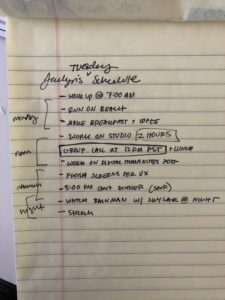
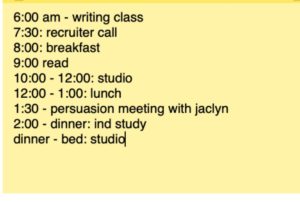
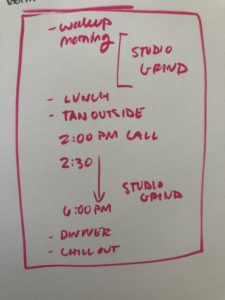
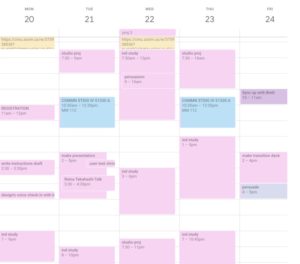
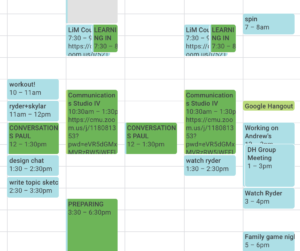
We were discovering that it’s easy to let yourself go in your personal schedule when nobody is holding you accountable!
Intervention
Because we felt that there were pros and cons to both keeping your own schedule and sharing it with others, we want to test both options. We created a daily planning template for our project and plan to test it in two ways:
Intervention 1: Fill out the schedule and keep it to yourself
Intervention 2: Fill out the schedule and post it in a shared space for the entire day
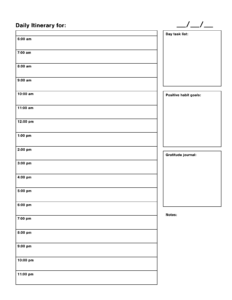
Documentation
Jenni’s documentation
Day 1:
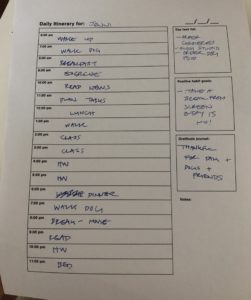
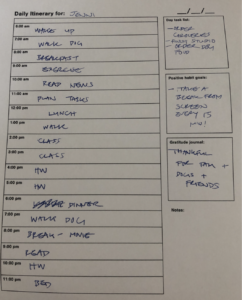
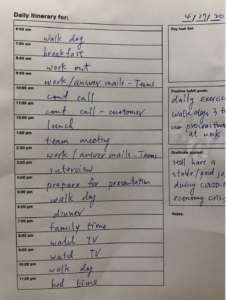
Day 2:
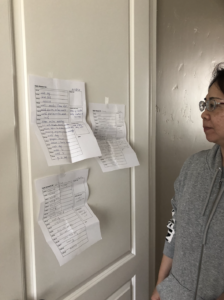
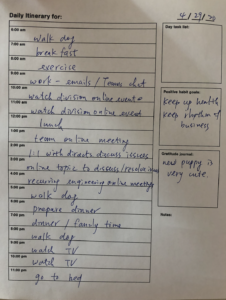
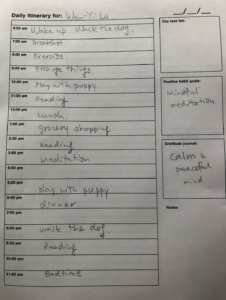
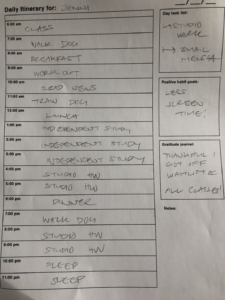
Jaclyn’s documentation
Day 1:
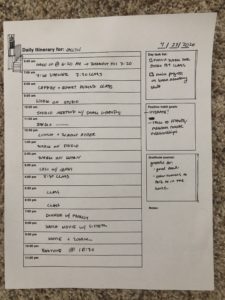
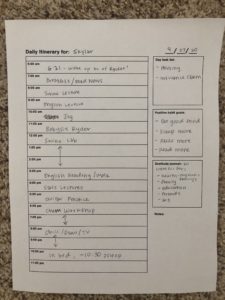
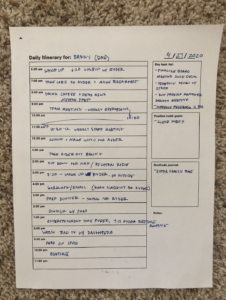
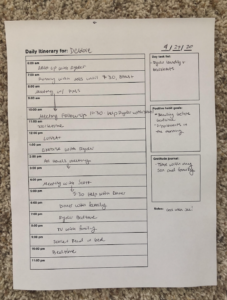
Day 2:
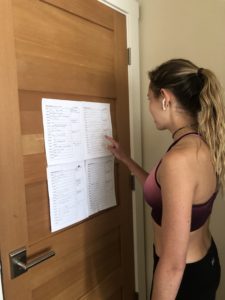
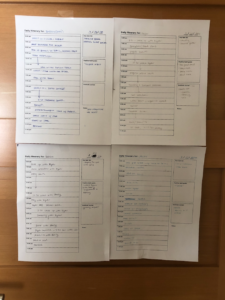
Interviews
After we completed both rounds of testing, we both sat down with our household (after dinner, before dessert) and talked about their personal experience with this intervention. After all, we are mainly focused on our own perception of time and productivity, so personal insights are paramount to our conclusions.
These are the interview questions we set for ourselves, but we made sure to keep the conversation organic and ask follow-up questions as we saw fit.
Do you think this exercise affected your daily accountability?
Did you stick to your plan?
How conscious were you about time passing during each scheduled day? Did it feel like time passed more quickly or slowly during either of the scheduled days?
Did you enjoy filling out the schedule?
How did it make you feel to share your schedule with the other people in this household?
From these conversations, we pulled some key insights:
Jenni’s household:
Ming (father)
Wen-Yi (mom)
Jenni (me)
Do you think this exercise affected your daily accountability?
Ming: “It didn’t affect me that much because I already use Outlook Calendar, but it was still useful to keep track of everything. I did feel more accountable when my schedule was shared with you and your mom, though.”
Wen-Yi: “When I kept the schedule to myself, I didn’t really follow it. But I felt like everyone was paying attention to what I was doing.”
Jenni: “It definitely did, I’m someone who likes to plan everything so this was useful.”
Did you stick to your plan?
Ming: “Yes, of course I needed to stick to my plan because of my set meetings for work.”
Wen-Yi: “I did stick to my plan mostly, but because the dog’s behavior varies, it’s hard to plan it down to the minute.”
Jenni: “Not really, I’m terrible at sticking to plans aside from group projects and classes, but it did make me feel more organized.”
How conscious were you about time passing during each scheduled day? Did it feel like time passed more quickly or slowly during either of the scheduled days?
Ming: “It felt the same honestly.”
Wen-Yi: “It didn’t feel faster or slower, but I did develop a sense of expectations for the next thing I was going to do.”
Jenni: “I had more of a feeling of put-togetherness and organization. Time didn’t pass faster or slower.”
Did you enjoy filling out the schedule?
Ming: “I have no choice but to fill out my schedule, so it was kind of stressful to list everything out. Again, I already have my Outlook calendar. But I did enjoy reflecting on what I’m thankful for, it made me take my mind off of work.”
Wen-Yi: “It was kind of repetitive to plan out my schedule for two days in a row. But one of my goals is mindfulness, and I think that mindfulness means being accountable for your daily actions and having a good routine every day. Finding small joys even within a mundane day. That’s why I liked the gratitude journal.”
Jenni: “Yes, it was nice to see what my day would be like at a glance.”
How did it make you feel to share your schedule with the other people in this household?
Ming: “It did make me feel more accountable for things, because you could just ask me what I was doing and see if I was actually following it. But I did feel less comfortable with everyone seeing my schedule. I typically don’t like sharing my schedule.”
Wen-Yi: “It felt kind of useless because it’s not like anybody cared about what I was doing. But it did make me want to follow my schedule more than when you told me to keep my schedule to myself.”
Jenni: “Effective but uncomfortable.”
Jaclyn’s household:
Barry (father)
Skylar (sister)
Debbie (stepmom)
Jaclyn
Do you think this exercise affected your daily accountability?
Barry “In some ways, but only the items in my planner that we’re related to my work, like what time I started making dinner. I have enough accountability methods set in place already for managing my time at my company that writing them down on paper didn’t really change anything.”
Barry “It was a little redundant”
Skylar “I usually just like make up all the things I have to do in between my scheduled class times, so it was kind of nice to structure out my entire day rather than just my ‘school day’”
Did you stick to your plan?
Skylar “Yea. I was kind of thinking about whether you guys would notice if I didn’t go running when I said I would, so I was definitely on time to do that.”
Debbie: “Yes, but I don’t usually stray from my schedule. I have to keep it really tight because I’m talking with clients who are in different time zones. If I mess up my timing for my Hong Kong office, they’re not as flexible.”
Jaclyn: “I did, but also because I had a shared commitment where I had to take care of Ryder and you (debbie) and my Dad were aware of that and counting on me. I tried to plan everything else out so that I could do that.”
How conscious were you about time passing during each scheduled day? Did it feel like time passed more quickly or slowly during either of the scheduled days?
Barry “I always schedule my days. I guess it was a little weird to re-plan my day out on paper. Made me realize how much time I dedicate to taking care of Ryder, and try to squeeze work in between that.”
Debbie “The afternoons felt shorter since instead of just playing with Ryder indefinitely, I had now scheduled a time block to garden with him.”
Jaclyn “I felt like there was a little more structure, or at least a communal agreement that each hour of the day has an assignment and slacking off wasn’t anywhere in the schedule.”
Barry “Sure, but that’s never in the schedule for me anyway. I always have a toddler to take care of.”
Skylar “It was nice to just sit and play around outside with Ryder for awhile. I actually feel like the days sometimes rush by because I have so many lectures, so having this set time just to ‘watch’ slowed it down.”
Did you enjoy filling out the schedule?
Barry “No. I don’t use pens anymore and this was annoying.”
Skylar: “Yea but it was kind of weird to share it. Maybe I stuck to it a little but better but I kind of felt like I couldn’t write everything I wanted to do because I knew you all would see how I prioritize my day.”
Debbie: “I liked the gratitude journal. It was redundant to plan out my day again, but posting what I’m grateful for for the whole household was kind of a nice thought. I don’t mind sharing that with you guys.”
Skylar: “Yea, the gratitude thing was nice because it was a way to say ‘thank you’ to the family indirectly.”
Jaclyn: “I liked that if the task list had items on it that pertained to other members of the household (like laundry), it was public. I knew Debbie was washing bed sheets today so I refrained from putting a load in. But that made me recalibrate my day. Also maybe we could just say this verbally.”
How did it make you feel to share your schedule with the other people in this household?
Reflection
This project was a good opportunity for us to step back and metacognitively reflect on something as abstract and subject-to-change as day planning. Especially in these unprecedented times, it’s easy to lose track of a sense of structure. Initially, we thought that this project would be more geared towards how to streamline the day-planning process. However, after involving our family members in the process and including the “gratitude journal” in the planner, we realized that the most valuable outcome was gaining a sense of gratefulness for the things in our life. Whether that be family, having a stable job, having a cute dog, or getting laundry done, it was evident that starting a day with a more appreciative and optimistic mindset was a good driving force for a productive day.